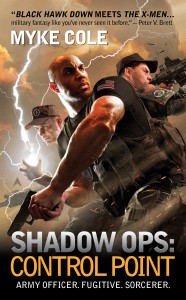Matthew Jones: At the last World Fantasy Conference, I had the privilege to meet a new author named Myke Cole. Just out of the blue, he showed up and asked if I wanted to play some first-person shooter (FPS) game with him and some friends. I’m pretty crappy at console FPS games, but I decided, sure, why not. Later, I saw him in his full Coast Guard uniform, and we started talking about our time in the military. I spent six years in the Air Force, one of those in Iraq. Thus, when I found out he had written a military fantasy novel, I was pretty excited to read the novel.
Since the convention, I’ve both read the novel and quite enjoyed it. His writing expertly blended the military life and culture I remembered with the fantasy I’ve enjoyed for so long. The foreign settings, combined with the quickness of the battle and the uncertainty that was always riding on your shoulders definitely reminded me of my time overseas. Add to that the emotions of a man who just had everything he has ever known taken away from him, surrounded by people who had the ability, and often the duty, to kill, adds to the tension.
As I read, I wondered about the Military feel and how he was able to achieve that forward operating base (FOB) feel. He agreed to do a guest post for us and answer this question. He does use a lot of military lingo in his response, so I tried to go through and add definitions to many of the terms. You can hover over the abbreviations for the full term, and I added a quick glossary after his post. Feel free to comment if you have any other questions.
Myke Cole: I think it’s true that there’s a certain “FOB Feel” that exists in military culture these days. There are jokes and catch words (remember calling someone who’d never been outside the wire a “Fobbit?” Heck, “outside the wire” is a term that evolved from our use of FOBs and COPs, right?). Inside jokes are always the first signs of an emerging culture, and there’s definitely a shift from cold war garrison life to the new reality of COIN ops on a FOB or COP where you have a PX that’s as big and well-stocked as any Walmart, but you’re also at risk of getting killed by indirect or a rogue contractor who was hired to take out the trash or serve your chow.
That FOB Feel was something I definitely tried hard to evoke in CONTROL POINT. I did this for a few reasons, the first was that it is the most authentic indicator of modern combat experience I can think of these days, and one that sets our generation of war-fighters apart from our fathers. Our dads (if they served) could probably draw parallels to Vietnam, but it lacks certain reference points. For me, many of these were visual. The concrete T-Wall and the enduring mud were two important ones. The T-Walls were always in my peripheral vision, providing eerie analogies to my current life in New York City (that same feeling of the sky being cut off, of walking the rainforest floor), and serving as a constant reminder that indirect was coming, and with it, the shrapnel those T-Walls had been built to stave off.
I also wanted to evoke the FOB Feel because, when I sat down and thought about it, it made the most sense for a US military presence in a magical universe. The US military does many things well, but self-sustaining logistics in a forward AOR is perhaps what we do best, and one of the reasons we’ve been so successful in our military history. The FOB/COP model was the logical one for an American unit unsure of resupply and confronted by an uncertain landscape populated by hostile unknowns. Like the Romans, we turtle up, trying to buy ourselves the time for intel to catch up to the environment and give us a good look at what we’re dealing with. There really wasn’t a lot of difference between goblin clans and the Jaysh al-Mehdi in this case. Both were totally alien to us. Both were potentially deadly.
I was also really impressed by the tight integration between uniformed personnel and military contractors (Mercenaries. My first two tours were as an employee of these firms). This is, of course, nothing new (The East India Company, the Hessians, heck, Balearic slingers), but the resurgence of the mercenary and the public’s willingness to accept them in the cloud of fear immediately post 9/11 was a phenomenon I wanted to capture. The resurgence of magic in the SHADOW OPS universe is every bit as frightening to the public as the towers coming down, and their reaction had to extrapolate realistically. Mercenaries were a logical piece of that, and so, Britton’s ultimate fate (and Marty’s as well) resulted.
It’s funny. I never really thought of writing CONTROL POINT as all that . . . cathartic, but I am realizing in writing this guest post that it was a way to at least consider what I had experienced, if not to reconcile it in some way. If vets like you see their own experience reflected in the story, then I am enormously gratified.
Glossary
- FOB
- Forward Operating Base. A secure military base that is within a hostile territory.
- COP
- Combat Outpost. A well prepared, armored outpost designed to confront enemy forces.
- PX
- Post Exchange. Think of this as the Walmart of military bases.
- AOR
- Area of Responsibility. The area that a command has authority to operate in.
 Guest Writer Bio:As a security contractor, government civilian and military officer, Myke Cole’s career has run the gamut from Counterterrorism to Cyber Warfare to Federal Law Enforcement. He’s done three tours in Iraq and was recalled to serve during the Deepwater Horizon oil spill.All that conflict can wear a guy out. Thank goodness for fantasy novels, comic books, late night games of Dungeons and Dragons and lots of angst fueled writing.Myke is the author of Shadow Ops #1: Control Point.
Guest Writer Bio:As a security contractor, government civilian and military officer, Myke Cole’s career has run the gamut from Counterterrorism to Cyber Warfare to Federal Law Enforcement. He’s done three tours in Iraq and was recalled to serve during the Deepwater Horizon oil spill.All that conflict can wear a guy out. Thank goodness for fantasy novels, comic books, late night games of Dungeons and Dragons and lots of angst fueled writing.Myke is the author of Shadow Ops #1: Control Point.
You can find Myke online at www.mykecole.com, or on Facebook, or Twitter.



